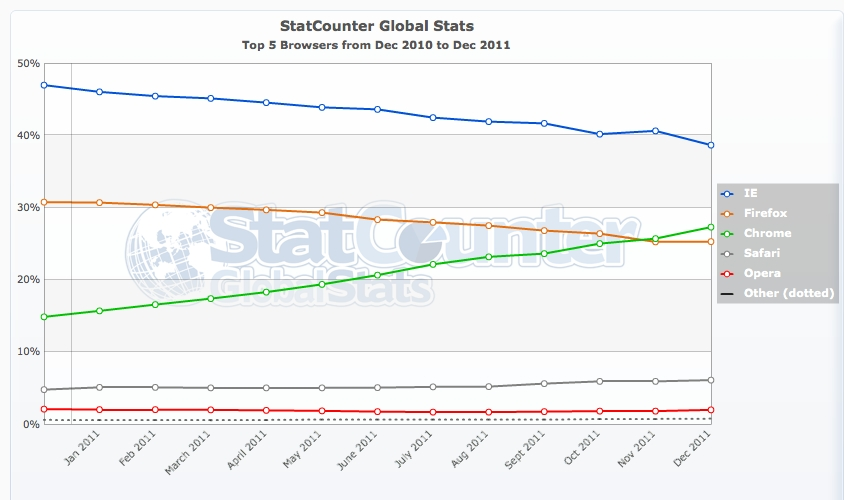A new year means that it is time to revisit the predictions about Open Source and technology in 2011 I made at the end of 2010. As before, I’ve tried to be entirely honest with my assessment. If I’ve got something wrong please leave a comment and I’ll correct it.
-
On the PC front Netflix will continue to require Silverlight for streaming, although they’ll finally get their act together and make it work well with GPU acceleration. Interfaces for Netflix will all move the route of the PS3 and adopt an HTML based interface. Mostly true - Netflix still requires Silverlight, arguably making it the only thing that is keeping Microsoft from killing Silverlight. Apparently the GPU acceleration issue is more due to Silverlight than Netflix, so I can’t totally fault them there. Although, seriously, Flash and HTML5 both feature GPU acceleration. Most of the interfaces have moved to pure HTML - with the Windows Media Center (developed and supported by Microsoft) and XBox 360 interfaces being notable exceptions. It seems as though Netflix has a Microsoft problem.
-
Google will meet it’s match and discover that the movie and TV studios really don’t want to work with them and will be forced to pull the plug on Google TV. Mostly false - Google TV has had it’s problems this year. In November, Logitech, one of the biggest supporters or Google TV said it was a huge mistake and had cost them $300 million. Nonetheless, Google TV soldiers on. Given the reduction in support for Windows Media Center, it seems that if Google TV ever got Live TV and timeshifting support it could be a great product. We’ll see what Google says at I/O this year, but I highly doubt that Google TV is going the way of the dodo.
-
Although Google will continue to tout the number of Android phones available as a success metric for the project, it will continue to see fragmentation and iPhone will remain the phone to beat. True - I could be generous and describe Android as a clusterfuck. However, I’ll let this chart about long term Android support do all the talking for me. I realize that the chart talks about support, but it’s one very major piece of many problems in Android.
-
Despite all of the Android tablets and the upcoming Blackberry Playbook, the iPad will remain dominant and continue to sell more than all the other tablets combined. True - I didn’t anticipate the Kindle Fire, but given that every other tablet has landed with relatively loud thuds I think this is a safe claim. The iPad is still the tablet to beat in the market. There are tablets that are faster and have more features, but they’re still chasing the iPad.
-
RIM will introduce a new OS for their phones based on the Playbook’s OS. The OS will be open sourced but will fail to attract any sort of market movement. Half True - RIM introduced BBX, later renamed Blackberry 10. RIM does provide over 100 Open Source libraries for Blackberry 10, but the core operating system is not Open Source.
-
Chromium OS from Google will land like a lead balloon. Initial reviews of the device will be severely hampered by the inability to access many services without Internet access. True - I travel a lot. I see lots of people with lots of gadgets. I’ve never seen someone with a Chromebook. Early reviews of Chromebooks were less than glowing. I don’t recall seeing any big push for Chromebooks for the holidays. I’m open to evidence to the contrary.
-
The browser wars will continue to heat up (hello, 1998!). Firefox’s market share will remain relatively stagnant while Chrome’s market share grows. This stagnation will result in some shakeups at Mozilla as they attempt to re-evaluate the market landscape. This will eventually lead to a new and lighter desktop browser based off Firefox. Half True - Chrome has continued to gain market share and Firefox has fallen off. However, Mozilla has not experienced any major shakeup. Rather they’ve become more focused on their core purpose of delivering an open web. It seems as though the browser is secondary, which is probably a good thing overall.

-
Open Source hardware outside of Android will generally continue to falter. This includes OLPC and the Boxee Box (re-run from last year). Kinda True - Although Boxee is doing better than I would have expected it seems as though the only Open Source consumer hardware people talk about is Android based. I am, however, only marking this as kinda true because the variety of Open Source hardware available for the maker community (arduinos, rep raps, maker bots, lasersaurs, etc), is staggering. I was referring to consumer hardware in the original prediction, but I wasn’t specific enough to call this completely true.
-
We’ll see the first lawsuit regarding ownership of code in an Open Source project after the code of an original author has been patched out and the project license changed (re-run from last year). False - I haven’t seen anything like this.
-
Apache will have a significant long term shakeup regarding their relationship with Java. I’d imagine that this means that the Java projects are jettisoned into a new foundation. Mostly False - Although Apache has taken it’s hits this year, mainly because of it being lured into Oracle’s anti-community trap related to OpenOffice.org, there hasn’t been a major shakeup.
Total score: 3 completely true, one mostly true, two half true, one kinda true. Assigning point values of 1, 0.75, 0.5, and 0.25 for each of those categories, my total score is 5. About 50% of a perfect score, although I had some element of truth to 7 out of 10 of my predictions. Not bad, we’ll see how my career as a pundit progresses in 2012.